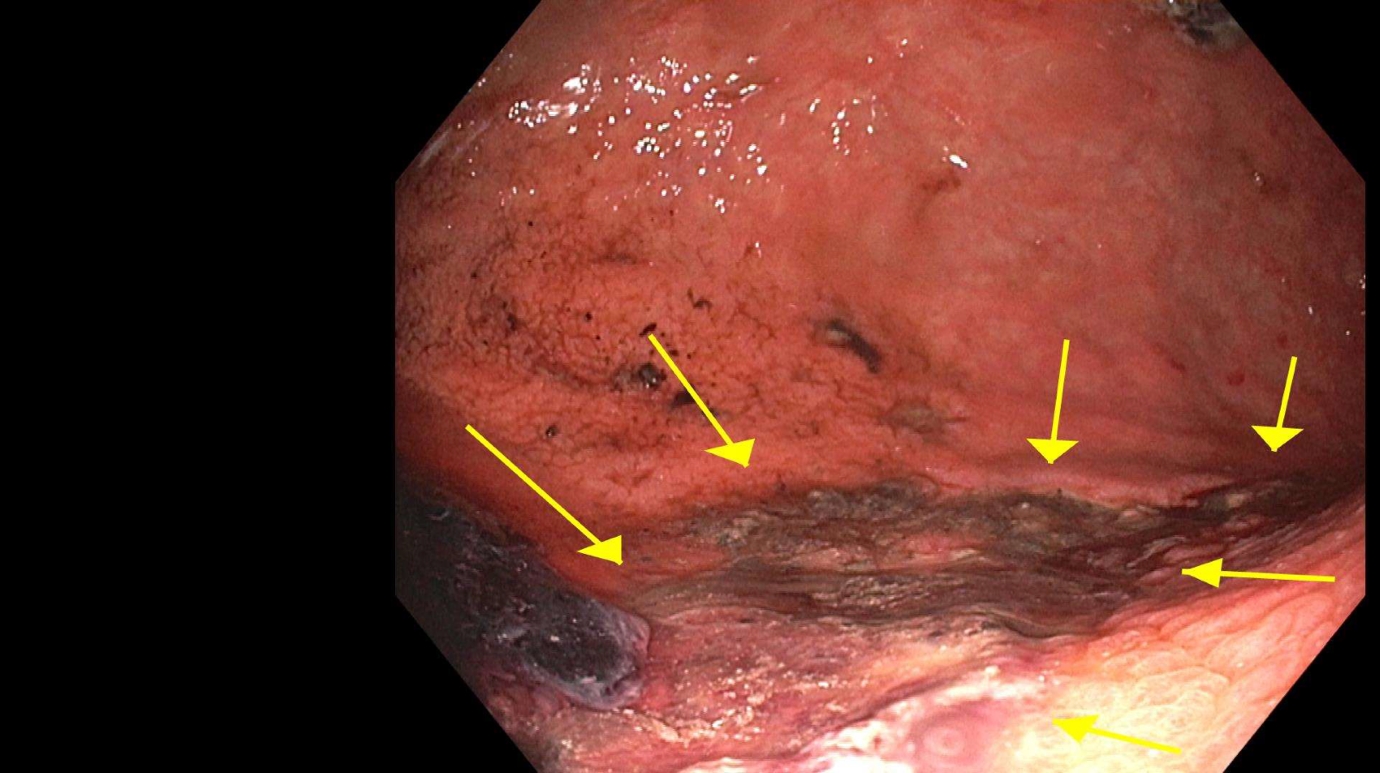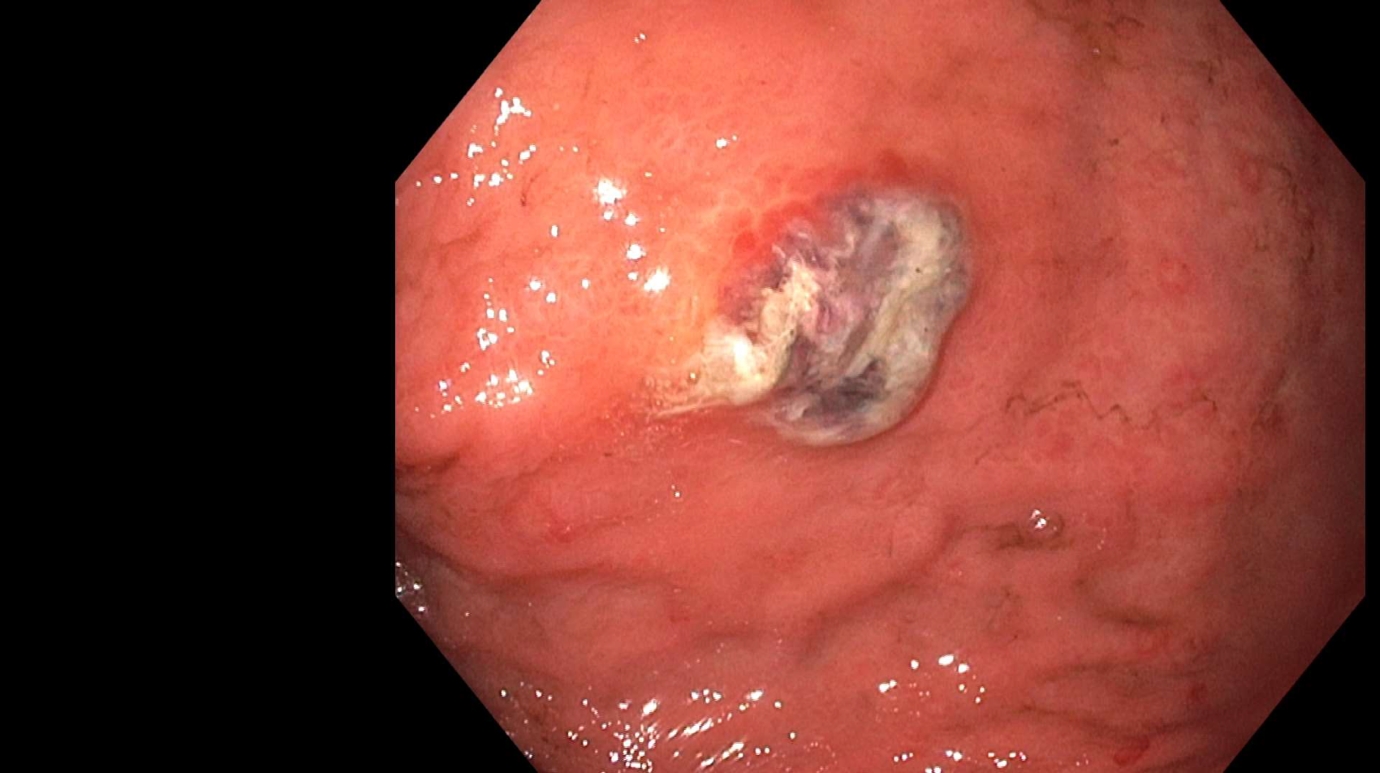Sunday Poster Session
Category: Infections and Microbiome
P1340 - Invasive Gastric Mucormycosis With Concomitant Cytomegalovirus (CMV) and Herpes Simplex Virus (HSV) Gastritis: A Rare Complication of Immunosuppression
Sunday, October 26, 2025
3:30 PM - 7:00 PM PDT
Location: Exhibit Hall

Kenneth C. Barnett, MD
University of Oklahoma Health Sciences Center
Oklahoma City, OK
Presenting Author(s)
Award: ACG Presidential Poster Award
Luke Sorensen, MD, Kenneth C. Barnett, MD, Jiteshwar Pannu, MD, Javid Fazili, MD
University of Oklahoma Health Sciences Center, Oklahoma City, OK
Introduction: Gastritis refers to inflammation of the gastric mucosa and can result from a wide range of insults, with clinical manifestations ranging from asymptomatic to severe disease associated with significant morbidity. In this report, we present a unique case of polymicrobial gastritis caused by Rhizopus oryzae, cytomegalovirus (CMV), and herpes simplex virus (HSV) in a profoundly immunocompromised patient.
Case Description/
Methods: A 47-year-old male with recently diagnosed diffuse large B-cell lymphoma, complicated by diffuse intracranial and spinal metastases (on chemotherapy), was admitted with symptoms of chest pain, nausea, vomiting and fever following a recent urinary tract infection. Initial labs revealed pancytopenia, acute kidney injury, and lactic acidosis. Patient continued to deteriorate, requiring vasopressor support and was intubated due to progressive respiratory failure.
He was noted to have bloody output from his nasogastric tube leading to an esophagogastroduodenoscopy, which revealed multiple large, oozing gastric ulcers. Biopsies showed severe active gastritis with abundant viral inclusions and areas showing fungal elements. Immunohistochemical stains for CMV and HSV were positive. PAS/D and GMS stains confirmed the presence of fungal hyphae with molecular testing identified Rhizopus oryzae complex. He was started on a multi-drug antifungal regimen including liposomal amphotericin B, micafungin, posaconazole and intravenous ganciclovir.
Despite aggressive medical therapy, the patient continued to deteriorate and then decided to transition to hospice care.
Discussion: Invasive fungal infections involving the gastrointestinal (GI) tract are exceedingly rare and predominantly occur in immunosuppressed individuals. Rhizopus oryzae is particularly aggressive with a predilection for angioinvasion and tissue necrosis leading to a high mortality rate. Approximately 7% of all mucormycosis cases occur in the GI tract, with mortality rates as high as 85%. Concomitant CMV and HSV gastritis is an uncommon occurrence. To the best of our knowledge, this is the first reported case of simultaneous gastric co-infection with R. oryzae, CMV, and HSV. The patient’s profound immunosuppression from chemotherapy created an environment conducive to fungal, viral, and bacterial infection. This case illustrates the complexity and severity of polymicrobial gastric infections in immunocompromised hosts and the importance of early endoscopic/histologic evaluation in cases with gastrointestinal symptomatology.

Figure: One oozing small gastric ulcer with rolled margins was found on the anterior wall of the stomach.

Figure: One oozing cratered very large gastric ulcer was found in the proximal gastric body.
Disclosures:
Luke Sorensen indicated no relevant financial relationships.
Kenneth Barnett indicated no relevant financial relationships.
Jiteshwar Pannu indicated no relevant financial relationships.
Javid Fazili indicated no relevant financial relationships.
Luke Sorensen, MD, Kenneth C. Barnett, MD, Jiteshwar Pannu, MD, Javid Fazili, MD. P1340 - Invasive Gastric Mucormycosis With Concomitant Cytomegalovirus (CMV) and Herpes Simplex Virus (HSV) Gastritis: A Rare Complication of Immunosuppression, ACG 2025 Annual Scientific Meeting Abstracts. Phoenix, AZ: American College of Gastroenterology.
Luke Sorensen, MD, Kenneth C. Barnett, MD, Jiteshwar Pannu, MD, Javid Fazili, MD
University of Oklahoma Health Sciences Center, Oklahoma City, OK
Introduction: Gastritis refers to inflammation of the gastric mucosa and can result from a wide range of insults, with clinical manifestations ranging from asymptomatic to severe disease associated with significant morbidity. In this report, we present a unique case of polymicrobial gastritis caused by Rhizopus oryzae, cytomegalovirus (CMV), and herpes simplex virus (HSV) in a profoundly immunocompromised patient.
Case Description/
Methods: A 47-year-old male with recently diagnosed diffuse large B-cell lymphoma, complicated by diffuse intracranial and spinal metastases (on chemotherapy), was admitted with symptoms of chest pain, nausea, vomiting and fever following a recent urinary tract infection. Initial labs revealed pancytopenia, acute kidney injury, and lactic acidosis. Patient continued to deteriorate, requiring vasopressor support and was intubated due to progressive respiratory failure.
He was noted to have bloody output from his nasogastric tube leading to an esophagogastroduodenoscopy, which revealed multiple large, oozing gastric ulcers. Biopsies showed severe active gastritis with abundant viral inclusions and areas showing fungal elements. Immunohistochemical stains for CMV and HSV were positive. PAS/D and GMS stains confirmed the presence of fungal hyphae with molecular testing identified Rhizopus oryzae complex. He was started on a multi-drug antifungal regimen including liposomal amphotericin B, micafungin, posaconazole and intravenous ganciclovir.
Despite aggressive medical therapy, the patient continued to deteriorate and then decided to transition to hospice care.
Discussion: Invasive fungal infections involving the gastrointestinal (GI) tract are exceedingly rare and predominantly occur in immunosuppressed individuals. Rhizopus oryzae is particularly aggressive with a predilection for angioinvasion and tissue necrosis leading to a high mortality rate. Approximately 7% of all mucormycosis cases occur in the GI tract, with mortality rates as high as 85%. Concomitant CMV and HSV gastritis is an uncommon occurrence. To the best of our knowledge, this is the first reported case of simultaneous gastric co-infection with R. oryzae, CMV, and HSV. The patient’s profound immunosuppression from chemotherapy created an environment conducive to fungal, viral, and bacterial infection. This case illustrates the complexity and severity of polymicrobial gastric infections in immunocompromised hosts and the importance of early endoscopic/histologic evaluation in cases with gastrointestinal symptomatology.

Figure: One oozing small gastric ulcer with rolled margins was found on the anterior wall of the stomach.

Figure: One oozing cratered very large gastric ulcer was found in the proximal gastric body.
Disclosures:
Luke Sorensen indicated no relevant financial relationships.
Kenneth Barnett indicated no relevant financial relationships.
Jiteshwar Pannu indicated no relevant financial relationships.
Javid Fazili indicated no relevant financial relationships.
Luke Sorensen, MD, Kenneth C. Barnett, MD, Jiteshwar Pannu, MD, Javid Fazili, MD. P1340 - Invasive Gastric Mucormycosis With Concomitant Cytomegalovirus (CMV) and Herpes Simplex Virus (HSV) Gastritis: A Rare Complication of Immunosuppression, ACG 2025 Annual Scientific Meeting Abstracts. Phoenix, AZ: American College of Gastroenterology.


